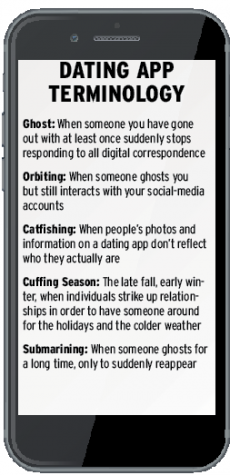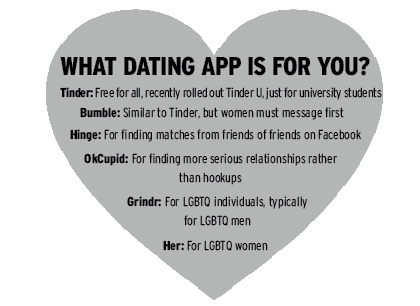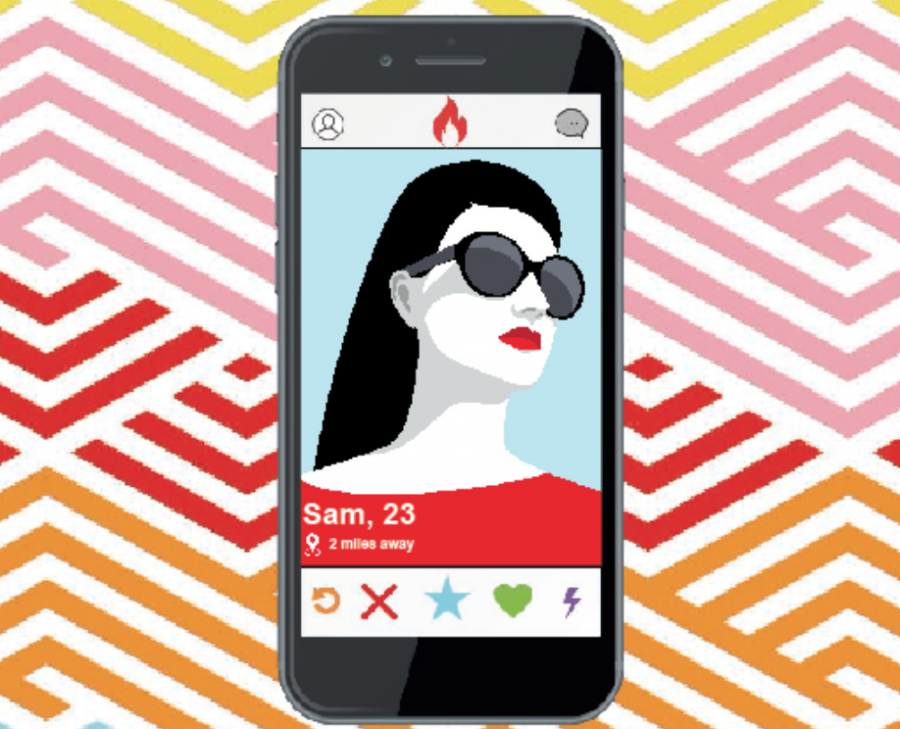Swipe Right: The dating game of the 21st century
Dating Apps like Tinder, Bumble, Grindr, and Hinge have changed the way people date forever.
February 13, 2019
I flip open the app in the early hours of the morning, unable to fall asleep. I’m greeted immediately with a 20-something man in light-wash denim and camo hat, holding a large fish. Two miles away. A swipe left, and a girl with warm brown eyes, wavy hair, and … a boyfriend hanging around her shoulders. Ugh, swipe left. Swipe after swipe, everyone from familiar faces in bars to coworkers to close friends file through, everyone looking for everything from a quick hookup to real love.
The popularity of dating applications has skyrocketed in recent years, with the mother of all dating apps, Tinder, kicking off in 2012. The app, as of last year, has an estimated 50 million users, according to TechCrunch. Apps such as Tinder, Bumble, OkCupid, Coffee Meets Bagel, Hinge, Grindr, and Her offer a massive landscape for people to find people, with some catering to specific groups, like LGBTQ individuals, or apps such as Farmers Only or Christian Mingle.
According to the Pew Research Center, as of 2016, nearly 1 in 5 18-24 year olds used dating apps. This shift in how young adults find love, or at least hookups, has changed the dating game forever.
For some, dating apps have ended in real relationships. University of Iowa sophomore Malaika Kigen used her former Tinder account to find her boyfriend of seven months, Nick. She downloaded both Bumble and Tinder with the purpose of finding someone to date.
“We were talking for two weeks — about everything,” she said. “We decided to go to B-Bops; it was a new place for us. We were both very shy, but I ended up talking the whole time because that’s what I do. My friends came with, not with us, but they came and sat near us to make sure I wasn’t going to get kidnapped, or murdered, or something. We ended up staying there for four hours talking.”
RELATED: UI play explores dating and relationships in the technology age.
Kigen and Nick began dating one month following the initial date. She said that the dating app has some benefits when it comes to social interaction.
“It might be easier online dating, because you don’t have to go out of your way to talk to someone and just say, ‘Hey,’ ” Kigen said. “Going after people in person is a little scarier. [Tinder] makes the playing field easier. It may be easier to get to know the person in person, though.”

On the other end of the relationship spectrum, some individuals use dating apps solely in casual settings, not to find serious relationships. UI junior Robby uses such apps as Tinder and Bumble on a casual basis.
“Tinder is for meeting new people with the idea of it being for romantic or sexual involvement. I don’t think I use them for anything different,” he said. “I take Bumble more seriously — the girl has to respond, so if they’ve taken the time to respond to me, I’ll take that more seriously.”
Robby said whenever he has downtime in his day-to-day, he’ll open Tinder to see if he has any matches and to swipe on new potential matches.
“It’s nice because you don’t really have that in-person anxiety that you get,” he said. “You get so lost in that moment that the moment is gone. Because it’s over text, it makes it easier to say what you want to say. I’m not super actively trying to hook up on Tinder, but if I have the opportunity, I’ll jump on it.”
A 2017 article in the Journal of Sociology titled “Liquid Love” argued that Tinder’s design is meant to take the stress out of dating and turn it into a type of game that doesn’t require a lot of time or investment.
“People [hook up], and it’s all good for them,” Kigen said. “What sucks is just like getting ghosted, when the person talks to you and stops. It messes with people’s self-esteem at times. Like, ‘What’s wrong with me, where’d they go?’ You were showing interest, and they were, too, and then they’re gone, and you’re left questioning yourself.”
Karla Miller, a trauma therapist with the Counseling Center of Iowa City and former director of Rape Victim Advocacy Program, said that while dating apps can help people find relationships that work out, there can also be a lot of problems with them when it comes to communicating what level of relationship both individuals want to have.
“When you’ve got somebody who does not have that goal [of a relationship], someone who’s just sort of skipping around, you can have a lot of mismatches, a lot of hurt, a lot of disappointment,” she said. “People feeling like they’re never going to find anybody, or, ‘Someone doesn’t find me attractive enough, because why doesn’t somebody date me more than a few times?’ ”
Miller stressed that communicating the goals of the relationship are important for users to avoid getting hurt, but that there can be vast miscommunications over apps and online.
“You lose 85-95 percent of communication, which is nonverbal,” she said. “I think people think speaking is the main form of communication, but it’s not, it’s the nonverbal stuff that we do. When you can’t see that, you miss that ‘were they joking, were they mad, what were they doing?’ and things like that.”
Additionally, when beginning sexual relationships, Miller said, there are two types of sexual relationships, ones simply initiated out of interest that remain primarily physical and ones in which individuals will have sex in order to bond intimately with another person. It is here where a lot of miscommunication can take place.
“You have to talk about that stuff, what you like and what you don’t like, and not just about sex,” she said. “If you have a question, ask it. ‘Are you interested in this or not?’ I think what stops people is the fear of rejection, that people will say no. But you want to know that ahead of time, you don’t want to not ask that question just because you don’t want to hear no.”
Despite miscommunication, Miller said, some of the draw to dating apps is the endorphin rush users can get.

“The beginning of a new relationship can be exciting, and all the chemicals that make you feel good are released. That can be very attractive, and for some people very addicting,” she said. “But it can also go too far. If your happiness depends on how long it takes for that person to respond to you, that can be a problem. It’s like, ‘Oh my God, why haven’t they responded, what does it mean?’ It could just mean they’re busy.”
UI freshman Maya Penning said the validation of gaining new matches is a driving factor for using dating apps.
“[Dating apps] are super shallow now,” she said. “Like Tinder, I don’t feel like it should be under ‘dating apps,’ I feel like it should be under the ‘games apps.’ It’s not even a dating app anymore. People are just swiping and swiping; it’s for the satisfaction of getting matches and knowing that you’re a valid person. You don’t message anyone; there’s no conversation.”
Many dating apps operate by allowing users to continuously swipe through profiles, swiping left for those you aren’t interested in and right for those you are. These profiles can have a good deal of information about the user but may just be a selection of photos.
“A lot of times, I’ll just blindly swipe right-right-right, and not even look at them. I just want to see if they’ll match with me,” Penning said. “I was swiping through very fast. There was this nice guy, he looked attractive, and so we matched. He was like, ‘Damn, you’re curvy. You must have some mixed blood in you.’ I was like, ‘Please don’t say that. You’re cute, but you’re not worth it.’ I knew people were racist, but I didn’t think they were so blatantly racist. I ended up un-matching him, and I’ve stopped doing the swipe-sprees.”
Penning said she would never had talked to him if they had met organically.
UI sophomore Brandon Mainock, who has used Bumble, Tinder, and OkCupid, said that while initial matches are based on physical attraction, there can be some serious issues with it.
“I do feel like it’s not honest. You can always Photoshop, you can always maneuver photos to get your best angles every single time,” he said. “It’s draining on the psyche. I view Tinder as more of a depressant on people. They look at themselves as not good enough, they dwindle themselves. It’s a societal construct that I don’t think should be out there. People don’t need to know that they’re bad. It’s really just hurting people’s pride.”
Mainock said that because of the way the system is set up, people’s personalities can be overlooked, and the focus is more based on physical looks.
“It was I think my third meet-up match, and she was more heavyset than what had been depicted and a bit shorter,” he said. “I didn’t really have a problem with it. I’m a very open-minded person, I’m not going to sit there and judge somebody on their physical appearance. But when the physical appearance is made out to be something different, the physical appearance is meant to be sold as something else, that’s more of a problem ethically for me.”
While some apps have verification systems to make sure users are the people in the photos that they post, apps such as Tinder do not have that in place. While on the lighter side of things, it can lead to parody accounts for fictional or historical figures, on the other end of the spectrum, there can be consequences.
Miller advised users to use caution with apps, because on these apps, people can be whoever they say they are, making catfishing a risk.
“It’s a predators’ playground. It is,” she said. “Someone who is taking advantage of people or someone who has interpersonal problems can be out there doing whatever they want to do. To the extent to where you can have a dating service that is first and foremost concerned with security … that’s pretty important.”
Miller advises users to notice any red flags that come up and to investigate anything that doesn’t feel right. She also said that while dating apps are here to stay, they aren’t a replacement for in-person relationship building.
“It’s important to realize that it’s not a replacement for face-to-face personal relationships based on trust, genuineness, and compatibility,” she said. “It’s fine to meet people that way, and if that’s all you want to do that’s cool, that’s fine. But I don’t think it’s a replacement for the face-to-face. We would really do well to have people learn how to begin a relationship, to tell whether someone is trustworthy or not.”



